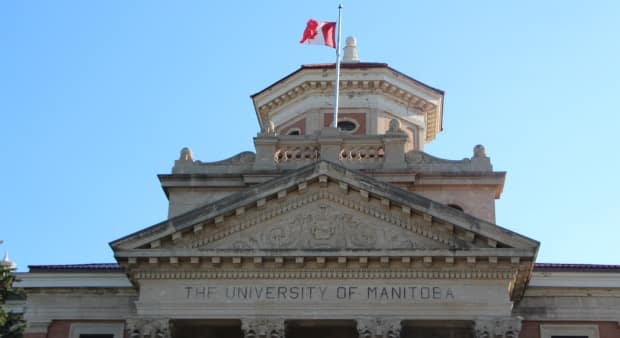Former University of Manitoba law dean disbarred after misspending $500K in school funds

A former University of Manitoba law dean has been given "the ultimate penalty" of disbarment in Manitoba after he misspent over half a million dollars in school funds, including racking up charges that amount to fraud, the provincial law society says.
Jonathan Black-Branch has been disbarred and his name has been removed from the Law Society of Manitoba's rolls of barristers and solicitors, according to a Feb. 14 decision from a law society disciplinary committee.
He also was fined $36,000.
During a hearing last fall, a law society disciplinary panel found Black-Branch had misspent over $500,000 of university and endowment funds on items such as education expenses, meals, accommodation and travel while he was dean of the U of M's law school, from 2016-20.
Black-Branch did not participate in the hearings or respond to the 28-page ruling from the panel last December, which found he had committed professional misconduct. The Feb. 14 decision outlines the penalties issued for that misconduct.
Black-Branch breached his integrity as a lawyer many times in a "pervasive and persistent scheme," and there has been no indication from him that he recognizes his actions were morally wrong, the February decision says.
The panel considered a range of consequences for Black-Branch, calling disbarment "the ultimate penalty."

The panel says it reviewed several similar cases where a disbarment penalty was issued for integrity breaches. Each had involved the misuse of similar amounts of money, but fewer instances of misconduct that generally took place over a shorter period of time, according to the panel.
Those factors make Black-Branch's breaches "more serious," its penalty decision says.
Black-Branch communicated with the law society via email, but he has not responded to multiple email requests from CBC sent during the fall misconduct hearings.
'A lot of trauma': current law dean
Richard Jochelson, U of M's law dean since 2021, said the Black-Branch saga has been a "feature" of his time in the position and continues to linger in his mind.
Publicity of the findings in Black-Branch's disciplinary hearing last year affected many people at the school, hurting those who had been close to the former law dean, he said.
"There was a lot of trauma to work through as a group," Jochelson told CBC News Thursday.
"They have their memories of the person … that starkly contrasts with what [they were] reading about in the paper, so that piece is really hard to navigate, but I think everyone's done a great job of supporting each other and getting through it."
Black-Branch was hired as the U of M law dean in 2016, but suddenly went on leave in May 2020.
A whistleblower complaint led to an internal investigation by the U of M around the same time, which found that summer that a senior university employee misspent university funds.
The university didn't publicly name Black-Branch at the time, but filed a complaint with the law society in 2020. It previously said it opted to do so after deciding not to pursue legal action.
University faculty, financial staff and three Winnipeg lawyers were among those who provided written and oral testimony and other evidence to the professional misconduct hearing panel last fall.
One financial staffer who testified during those hearings alleged that Black-Branch told them to "stop asking questions" about his expense claims and process them.
The largest sum of money misspent by Black-Branch — $472,000 — was associated with a U of M research and training endowment fund that he directed and chaired. He also authorized expenses from that fund, the disciplinary panel said in its December ruling.
That ruling also said some of Black-Branch's actions "amounted to fraud," including double charging for meals at Winnipeg restaurants and misrepresenting dozens of expense claims as professional in nature.
'A commercial death sentence'
The panel's decision on his penalty says it might be acting out of its jurisdiction if it were to order Black-Branch to pay back all of the money he misspent, but it has learned that the university reimbursed the $472,000 he took from the training endowment fund.
The U of M asked Winnipeg police last December to investigate Black-Branch's misconduct, after facing criticism by some — including a prominent ethics expert at the university and five of its law professors — for not taking legal action against the former law dean since he left the school.
In its December ruling, the panel said the evidence of Black-Branch's misconduct showed "even if the standard had been the criminal standard of beyond a reasonable doubt, the panel would have been satisfied that proof was sufficient."
When the U of M was asked why it decided to ask for a police investigation last December, it pointed to that specific passage in the ruling.
Jochelson sympathizes with critics of the U of M's approach but says it makes sense as a legal scholar, since pursuing legal action before the panel's ruling was made may have been detrimental to an investigation or incriminating if Black-Branch had been exonerated.
In order to prevent future misspending, Jochelson says the university now assesses the dean's expenses every three months, and has adopted three-year budget reviews in addition to annual budgets. The law school is also undergoing an external review process.
Lawyers spend years studying and building their reputations, which means disbarment can be considered "almost like a commercial death sentence," he said.
"It really is a stark reminder that being a lawyer isn't just a job, but there's an institutional function in society, and if you deviate from that — you just can't be part of it."
Rocky Kravetsky, who represented the law society during Black-Branch's discipline hearing, previously said Black-Branch could reapply to be licensed in a decade if he were disbarred in Manitoba.
He also said he intended to notify his counterparts in the U.K. — where Black-Branch is also licensed and owns property — when the case wrapped up.

